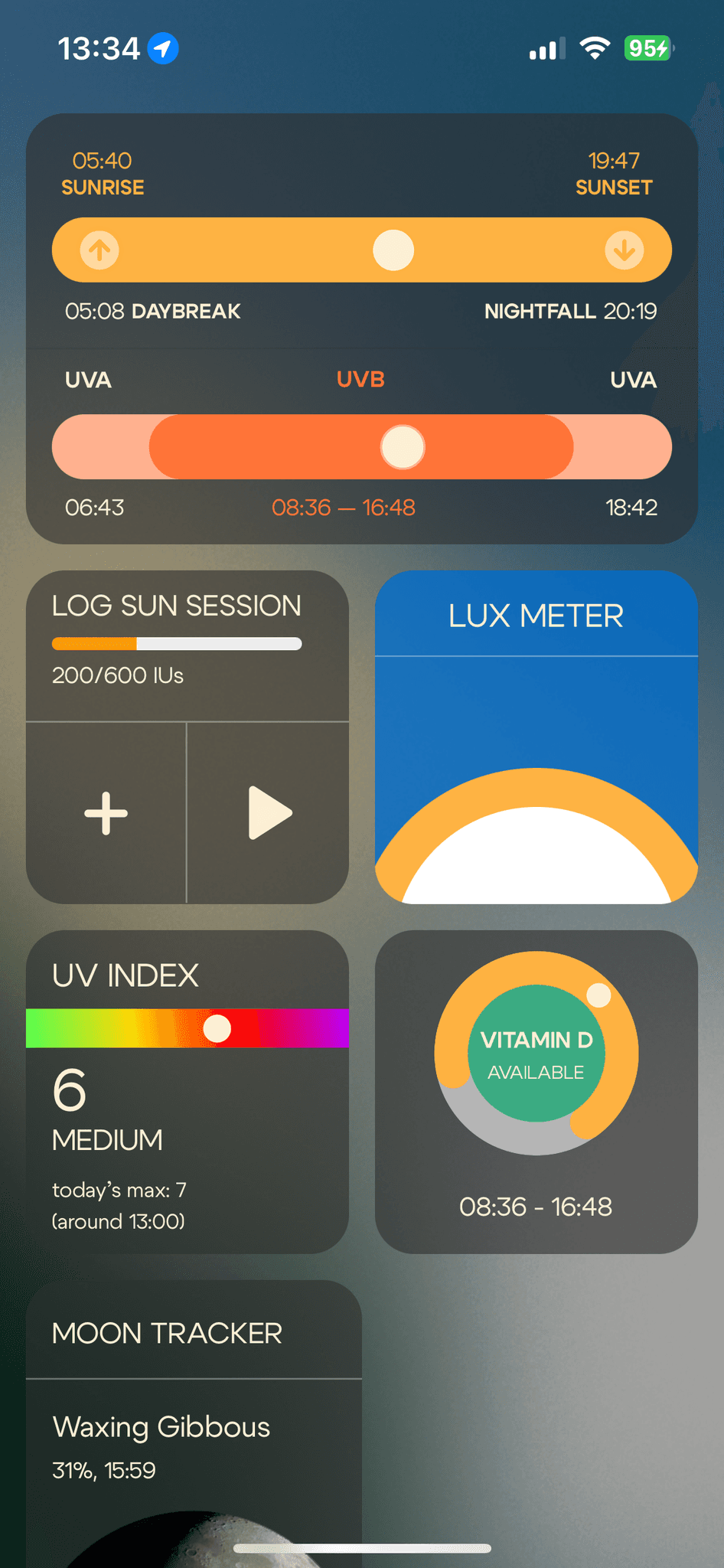
Log Sun Session
This feature is to help you gauge a good amount of time in the sun to help you build a solar callus & make vitamin D. We do not guarantee the amount of vitamin D shown on the app will be the amount of vitamin D that your body actually makes.
This sun session is not meant to overshadow or trump medical advice that you have received from your doctor or healthcare practitioner. Please understand that the MyCircadianApp timer is for informational purposes only & does not seek to be diagnostic or replace medical advice. Use the timer with your own discretion.
The sun session timer will give you a recommended time to spend out in the sun based on inputs you provide: Fitzpatirck Skin type, amount of clothing & cloud cover, and will utilize an estimated UVI.
More on “Vitamin D” Vitamin D is indeed a complex hormone, often referred to as a prohormone because it requires activation through metabolic processes to exert its full effects. Here are some important details to understand:
1. Vitamin D Metabolites
There are dozens of vitamin D metabolites in the body, each serving unique roles in maintaining health. The most studied forms are:
Cholecalciferol (Vitamin D3): This is the form of vitamin D produced in the skin through exposure to UVB light. It is also found in some foods and supplements.
Calcidiol (25-hydroxyvitamin D): This is the storage form of vitamin D and is measured in blood tests to assess vitamin D levels. The liver converts cholecalciferol into calcidiol.
Calcitriol (1,25-dihydroxyvitamin D): This is the active form of vitamin D that is produced in the kidneys from calcidiol. It is a potent hormone that regulates calcium and phosphorus levels, bone health, immune function, and more.
In addition to these major metabolites, there are many other vitamin D derivatives that play various roles in the body, from immune regulation to influencing gene expression.
2. Storage in Cells and Liver
Vitamin D is primarily stored in fat cells (adipocytes) and in the liver. Since vitamin D is fat-soluble, it can accumulate in fat tissue, providing a reservoir that the body can tap into when UVB exposure or dietary intake is low. However, this storage capability also means that individuals with higher body fat may require more vitamin D to reach optimal blood levels, as more of the vitamin may get sequestered in fat cells rather than circulating in the bloodstream.
3. Conversion Process
Once stored in the liver, vitamin D is gradually released into the bloodstream, where it can be converted into its active form. This conversion is regulated by various factors, including calcium levels, parathyroid hormone (PTH), and overall health status. For example, in times of low calcium or phosphate, the body increases the conversion of calcidiol to calcitriol to help maintain mineral balance in the bones and bloodstream.
4. Hormonal Functions
Vitamin D plays a much larger role than simply aiding in calcium absorption. As a hormone, it influences over 200 different genes, regulating functions such as:
Immune System Modulation: Vitamin D helps modulate both the innate and adaptive immune systems. Adequate levels are crucial for immune defense and preventing chronic inflammation.
Cell Differentiation and Growth: Vitamin D impacts cell differentiation, meaning it helps guide immature cells to develop into their specialized forms. This function is particularly important in preventing abnormal cell growth, such as in cancer.
Hormonal Balance: Vitamin D interacts with other hormones, including those involved in reproductive health, stress response, and metabolic processes. It plays a role in insulin regulation, for example, which is crucial for metabolic health.
5. Vitamin D Receptors (VDRs)
Vitamin D exerts its effects by binding to vitamin D receptors (VDRs) located throughout the body, including in the brain, heart, skin, immune cells, and bones. The widespread presence of VDRs highlights vitamin D's importance beyond bone health, impacting cognitive function, mood regulation, cardiovascular health, and more.
Vitamin D's role as a hormone extends far beyond its traditional association with calcium and bone health. It’s a key regulator of various systems in the body, and maintaining optimal levels is crucial for overall health and well-being.
For more information on Vitamin D - watch this video - https://youtu.be/CqiQ7zyWSR4
Our latest stories:
See all posts




